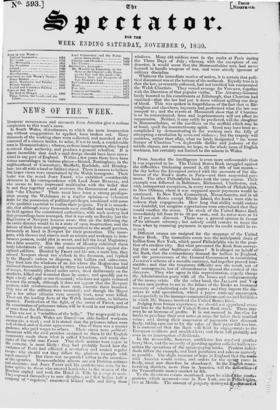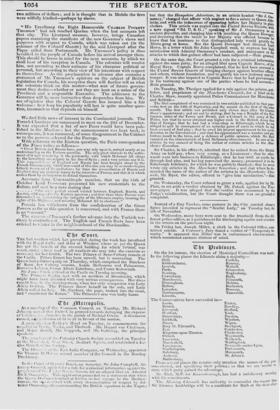From America the intelligence is even more unfavourable than it was expected to be. 'File United States Bank struggled against
the difficulties thickening around it, till the 9th of last month—
the day before the Liverpool arrived with the accounts of the dishonour of the Bank's drafts in Paris—and then suspended pay
ment. The other Philadelphia banks took the same course. 1 heir example was followed in Baltimore, Richmond, Charleston, and, with unimportant exceptions, in every town South of Philadelphia, to New Orleans, where it was supposed specie payments would be continued. In New York, Connecticut, Massachusetts, and in all the Eastern States except Rhode Island, the banks were able to redeem their engagements. How long that ability would endure was doubtful, but sanguine expectations were entertained that they would weather the storm. The stock of the United States Bank immediately fell from 20 to 30 per cent., and its notes were at 15 to 17 per cent. discount. There was a general opinion in favour of its ultimate solvency ; but nobody could venture to name the time when by resuming payments in specie its credit would be restored.
Different causes are assigned for the stoppage of the United States Bank. The immediate cause was the anticipated drain of bullion from New York, which quoad Philadelphia was in the position of a creditor city. But what prevented the Bank from answering that and other legitimate claims ? It is alleged on behalf of the Bank, that the extraordinary demand for bullion in Yaigland, and the perseverance of the General Government in maintaining JACKSON'S Scheme of a metallic currency, had together proved irresistible; and that the temporary difficulty was the result, not of bad management, but of circumstances beyond the control of the directors. They who agree in this representation, eagerly charge the Administration party with all the losses and. embirrasmentp of the money crisis. On the other hand, the JACKSON and VAg BUREN men profess to see in the failure of the Banks an inereasefl necessity of substituting coin for paper; and they impute the disasters to wild speculation, which a paper currency encourages, and especially to the immense commercial transactions and liabilities in which Mr. BIDDLE involved the United States Bank.
Judging from former experience, we should not apprehend eventual loss to the holders ot' United States 13ank stock. There may even be an increase of profits. It is not unusual in America for banks to purchase their own notes at sums far below their nominal value ; and during their suspension of payments they discount freely, taking care not to let the value of their paper fall too low. It is understood that the Bank will fulfil its engagements to the European creditors and stockholders; and there will probably not even be an interruption of dividends. In the meanwhile, however, confidence has received another heavy blow, and the necessity of guarding against calls for bullion restricts the operations of the specie-paying banks. Prudent individuals follow the example, and limit purchases and sales as narrowly as possible. The slight remnant of hope in England that the-trade... with America would revive, and orders for the spriiv 'come in freely, must now therefore be abandoned. In the EiWish manntheturing districts, more than in America, will the dieffeulties•ife the Transatlantic money-market be felt. 44' To the disastrous events mentioned must be added,lotitt ebnflagrations which occurred—one in New York, one in.hadelpitia, ,two at Mobile. The amount of ploperty destroyed t,914,tnatoti
two millions of dollars ; and it is thought that in Mobile the fires were wilfully kindled—perhaps by slaves.



























 Previous page
Previous page